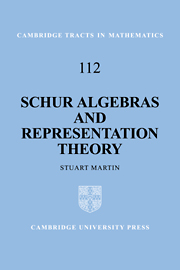Book contents
- Front matter
- Contents
- Introduction
- 1 Polynomial functions and combinatorics
- 2 The Schur algebra
- 3 Representation theory of the Schur algebra
- 4 Schur functors and the symmetric group
- 5 Block theory
- 6 The q-Schur algebra
- 7 Representation theory of Sq(n, r)
- Appendix: a review of algebraic groups
- References
- Index of Notation
- Index of Terms
Introduction
Published online by Cambridge University Press: 22 September 2009
- Front matter
- Contents
- Introduction
- 1 Polynomial functions and combinatorics
- 2 The Schur algebra
- 3 Representation theory of the Schur algebra
- 4 Schur functors and the symmetric group
- 5 Block theory
- 6 The q-Schur algebra
- 7 Representation theory of Sq(n, r)
- Appendix: a review of algebraic groups
- References
- Index of Notation
- Index of Terms
Summary
Between the years 1896 and 1900, G. Frobenius [1896], [1900] invented and mapped out the theory of complex representations of finite groups, paying special attention to representations of the symmetric group Σr. Thus, given a finite group we want to determine all group homomorphisms from our group into GLm(C) for arbitrary positive integers m. Around this time Frobenius suggested to his pupil Issai Schur that he might examine the representation theory of the infinite group Γc = GLn(C). The subsequent investigations appeared in Schur's [1901] beautiful doctoral thesis of 1901. Schur studied Γc by means of the C-space Ac(n, r) of r-homogeneous polynomial functions in the n2 coordinate functions on Γc. In particular he showed that the isomorphism types irreducible representations of CΓc with a given degree of homogeneity r are in one-to-one correspondence with the partitions of r into at most n parts; he also showed that the character of an irreducible module indexed by such a partition λ is a certain symmetric function, now called ‘Schur function’, sλ. In order to exploit Frobenius' work on Σr he set up (in modern parlance) an equivalence between the category of polynomial representations and the module category of Σr.
In another paper, Schur [1927] to analysed the actions of both Σr and Γc on the rth tensor power of the natural module for Γc (the space of n-columns over C).
- Type
- Chapter
- Information
- Schur Algebras and Representation Theory , pp. ix - xviPublisher: Cambridge University PressPrint publication year: 1994

